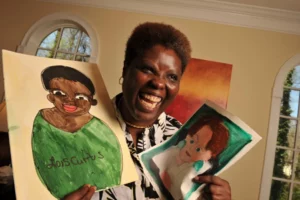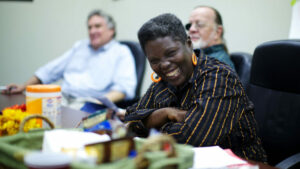
Lois Curtis proudly displays portraits that she drew. Photo Credit: Robin Rayne
Lois was institutionalized at the Georgia Regional Hospital beginning at age 11. By age 19, she knew she no longer wanted to live in an institution or take unwanted medications that drained her energy and kept her sedated. She began calling the Atlanta Legal Aid Society to seek their assistance to be released. It took years of legal fights by Lois Curtis, Elaine Wilson, and their supporters, but eventually they prevailed when the Supreme Court held in Olmstead that unjustified segregation of people with disabilities is a form of unlawful discrimination under the Americans with Disabilities Act (ADA). In a decision penned by Justice Ginsburgh, the Supreme Court ruled that:
“First, institutional placement of persons who can handle and benefit from community settings perpetuates unwarranted assumptions that persons so isolated are incapable or unworthy of participating in community life…Second, confinement in an institution severely diminishes the everyday life activities of individuals, including family relations, social contacts, work options, economic independence, educational advancement, and cultural enrichment.” – Olmstead v. L. C., 527 U.S. 581 (1999)
It took more time to find the right combination of supports for Lois to thrive in the Atlanta community she called home, in part because she was such a trailblazer. The systems of support Lois needed had to be newly created due to the transformational nature of the Olmstead decision.
“ Lois wanted to be free. She wanted to live on her own terms with dignity. In working to achieve that for herself, she made it possible for other disabled people to do the same. Lois Curtis’ impact cannot be overstated, and her advocacy will continue to shape the landscape of disability and civil rights for decades to come, said Maria Town, President and CEO of AAPD.
In addition to being revered as an advocate, Lois was beloved as an artist and a friend. Those closest to her remember that Lois loved music, singing, eating out, meeting people, shoe shopping, going to fairs, and drawing “pretty pictures.” Her friends remarked that she created artwork as she lived–her lines drawn without hesitation, her colors bold and saturated, her images spirited.
Lois wrote in 2010,

Lois Curtis smiles during a “micro-board” meeting. A group of her friends and supporters get together once a month to help Lois plan her life.
“To all the people living in institutions:
I remember you. Give me a prayer.
Sometimes I feel good about my life.
When I feel bad about my life I name my country, sing the gospel, and bring my mind back home.
I will sing with you again.
Have a beautiful day.
Love, Lois”
Lois Curtis died in her home in Atlanta, Georgia, on November 3, 2022. She was 55 years old. Lois will be laid to rest at the South-View Cemetery in Atlanta, Georgia, alongside many other significant American civil rights figures.
AAPD sends peace and comfort to Lois’ family, loved ones, and to our community who benefit from her efforts to ensure that disabled people have the right to live integrated within our communities, not segregated inside institutions. This fight is as urgent today as it was 23 years ago. Lois’ legacy and impact will live on in the disability rights movement as we continue to fight for community integration, de-institutionalization, and self-determination for all disabled people. Rest in Power, Lois.
